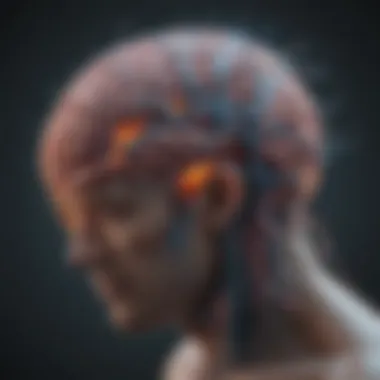Understanding Acute Clinical Depression: Symptoms and Treatment


Intro
Acute clinical depression can be overwhelming for both the individual experiencing it and their loved ones. Understanding what mental health is lays foundational knowledge for addressing acute clinical depression and related challenges. With mental health more prominently recognized today, its complexities are becoming clearer. Individuals often experience struggles that do not fall neatly into societal expectations of mood and functioning. By exploring mental health, prioritizing well-being, and recognizing issues, we embark on a path towards recovery.
Understanding Mental Health and Well-being
What is Mental Health?
Mental health encompasses emotional, psychological, and social well-being. To effectively discuss acute clinical depression, one must understand that mental health affects how we think, feel, and act. It also influences our ability to handle stress, relate to others, and make choices. Everyone falls somewhere on a spectrum of mental health. Factors influencing mental health might include genetics, environment, and personal experiences.
The Importance of Prioritizing Mental Well-being
Prioritizing mental well-being is fundamental to achieving a fulfilling life.
- Mental health influences quality of life.
- Healthy minds foster better relationships and work performance.
- Issues like acute clinical depression disrupt daily activities.
Understanding this importance prompts engagement in proactive strategies. Individuals are encouraged to seek harmony in their lives, thus minimizing the impact of dire conditions like acute clinical depression.
Common Mental Health Challenges and Disorders
A variety of mental health challenges exist.
- Anxiety disorders
- Bipolar disorder
- Post-traumatic stress disorder
- Acute clinical depression itself
Many struggles may be connected to, or exacerbated by, acute clinical depression. This connection illustrates the interdependence of various mental health issues.
Strategies for Improving Mental Health
Implementing practical strategies for improving overall mental health is essential.
Self-care Techniques and Practices
Self-care must be personalized but often includes living routines aimed at enriching health.
- Regular exercise
- Balanced diet
- Sleep hygiene
- Journaling
Incorporating these action into daily life might show positive effects gradually.
Building Resilience and Stress Management
Resilience helps one adapt and recover from stressful experiences. Techniques may include:
- Mindfulness practices
- Deep breathing exercises
- Facing fears gradually
Building such skills eases confrontation with acute clinical depression symptoms more effectively.
Seeking Professional Help: Therapy and Counseling
Seeking help from a mental health professional is central for addressing acute clinical depression. Therapists offer support, understanding, and effective strategies guide recovery.
Defining Acute Clinical Depression
Understanding acute clinical depression is vital to grasp the nuances of mental health in our times. This section lays the groundwork for deeper insights into why this condition demands a close look.
Overview of Depression
Depression itself is not a singular experience; it exists on a spectrum. Many people may face mild or moderate depressive episodes in their lives. Yet, acute clinical depression represents a serious escalation in this spectrum. According to sources like Britannica, it is marked by persistent feelings of sadness, hopelessness, and a significant decline in daily functioning. Symptoms can emerge due to various stressors or they may arise without any obvious cause.
A critical aspect to acknowledge is that acute clinical depression often intervenes in daily life. Individuals may struggle with basic tasks, social interactions, and work responsibilities. It can bring forth debilitating emotional pain and lead to serious consequences if not addressed promptly.
What Makes it Acute?
The designation of acute indicates that symptoms are severe and can escalate rapidly. Unlike chronic depression, where symptoms linger over a span of time without much fluctuation, acute depression can be characterized by varied severity within a short period.
Factors such as length of duration, intensity of symptoms, and the rapid onset of collective psychological distress firmly place individuals in this category. This type of depression often necessitates immediate medical attention due to the risk of suicide or self-harm.
"Acute clinical depression requires urgent interpersonal and institutional response; neglect may lead to irreversible impacts."
The distinction between acute and chronic depression underlines the importance of recognizing early signs and vulnerabilities in individuals. By understanding the acute nature of this mental health condition, appropriate interventions and compassionate support can be more effectively implemented.
Symptoms of Acute Clinical Depression
Understanding the symptoms of acute clinical depression is crucial in recognizing and addressing this severe condition. Symptoms manifest in multiple dimensions—emotional, physical, and cognitive—each affecting an individual’s daily life significantly. A thorough understanding of these symptoms enables early intervention, which can greatly aid recovery. It is essential that the information presented here is approached with care and serious consideration, as acute clinical depression is highly impactful on the quality of life.
Emotional Symptoms
Emotional symptoms often serve as the initial indicators of acute clinical depression. Individuals may experience profound sadness, hopelessness, or a marked lack of interest in activities once thought to be enjoyable. This disconnect from previously pleasant experiences is known as anhedonia. The emotional weight of acute depression can cause irritability and affect personal relationships.
It is important to note that emotional symptoms can also be accompanied by feelings of guilt or low self-esteem. People may perceive their situation as overwhelming, leading to constant rumination and negative self-dialogue. Recognizing these patterns is fundamental. Timely identification of emotional symptoms facilitates a deeper understanding of the underlying condition.
Physical Symptoms


Physical symptoms often accompany the emotional distress of acute clinical depression. These symptoms can vary widely and include fatigue, sleep disturbances, appetite changes, and unexplained aches and pains. Individuals might experience a slowdown of bodily functions, leading to significant energy depletion.
Moreover, changes in appetite can be pronounced, with some developing an excessive hunger while others may lose the desire to eat. Sleep patterns may also be irregular, resulting in insomnia or oversleeping. Physically, individuals often find it challenging to engage in regular activities, contributing to feelings of worthlessness.
This holistic view of depression should not be overlooked as these symptoms remind us the body and mind are interlinked.
Cognitive Symptoms
Cognitive symptoms of acute clinical depression can have widespread repercussions. A person’s ability to think clearly may diminish, leading to difficulty concentrating and making decisions. Often described as “brain fog,” this phenomenon can cause problems in academic or work environments.
Additionally, memory problems are common; individuals may struggle to remember trivial tasks or important details. Pessimistic thinking patterns may emerge, where there is a constant preoccupation with perceived failures or mistakes.
Patients often report thoughts of self-harm or suicide, making this awareness vital for timely intervention and supportive measures. The role of diligent understanding of cognitive symptoms is pivotal in ensuring safety and recovery strategies.
Understanding the multifaceted symptoms of acute clinical depression provides direction for effective treatment and support.
In summary, awareness and recognition of the emotional, physical, and cognitive symptoms serve as a guide for discussing depression, mental health strategies, and prompting engagement with healthcare professionals. By acknowledging these signs, the path toward managing acute clinical depression becomes increasingly clearer for both individuals and their support systems.
Causes of Acute Clinical Depression
Understanding the causes of acute clinical depression is critical, as they help demystify this overwhelming condition. Recognizing these causes provides insights into potential treatment pathways. It sheds light not only on preventive strategies but also enhances the comprehension of the indivudal experience with mental health issues. Factors converge to create a complex landscape that influences acute clinical depression. Let's explore several of these contributory elements in greater detail.
Biological Factors
Biological factors are essential in the manifestation of acute clinical depression. These factors often involve chemical imbalances within the brain. Neurotransmitters like serotonin, norepinephrine, and dopamine play a vital role in regulating mood. When their levels become dysregulated, one may experience an onset of depressive symptoms. Other biological elements include neuroanatomy — regions of the brain like the hippocampus may display structural differences in individuals with depression. In addition, thyroid dysfunction can often mimic or exacerbate depressive conditions. Recognizing how biology can influence mood allows for more targeted therapeutic approaches.
Genetic Predispositions
Genetic predispositions significantly impact the onset of acute clinical depression. If family members have a history of mood disorders, individuals may be at higher risk. While genetics does not solely determine one’s fate, it can create vulnerabilities. Studies show that specific genes are associated with the functioning of neurotransmitters. However, the interplay between genetic risks and environmental factors is complex. Genes do not act in isolation; the environment shapes how they exert their influence. This complexity underscores the importance of understanding both genetic markers and personal history when assessing acute clinical depression.
Environmental Influences
Environmental influences encompass a vast array of external factors that can precipitate acute clinical depression. Situations such as chronic stress, loss, trauma, and significant life changes can provoke or exacerbate depressive episodes. Socioeconomic status also plays a role; limited resources or high stressors about survival can significantly affect mental health outcomes. Furthermore, exposure to a toxic environment, whether it be in family, community, or workplace settings, can lead to negative mental health results. Recognizing these environmental stressors is crucial for effective intervention. Often, modifying one’s environment can lead to gradual improvement in mental health.
Psychological Factors
Psychological factors are internal constructs influencing the state of one’s mental health. Cognitive patterns, coping strategies, and emotional regulation skills are significant here. For instance, individuals prone to negative thinking or those with low self-esteem may find themselves more susceptible to acute clinical depression. Additionally, personality disorders can predispose individuals to higher instances of depression. Developing healthy coping strategies through therapy can address psychological vulnerabilities. Understanding these deeper psychological aspects can aid in personal recovery journeys and overall resilience against acute clinical depression.
Understanding the wide array of causes behind acute clinical depression is essential for better care and more timely interventions. Knowing these factors may provide individuals reassurance on their mental health journey.
Ultimately, recognizing how biological, genetic, environmental, and psychological elements coalesce helps frame the experience of acute clinical depression. By pulling these threads together, we gain a better understanding, potentially informing better strategies for prevention, treatment, and support.
Diagnosis of Acute Clinical Depression
Diagnosis plays a critical role in the context of acute clinical depression. An accurate diagnosis not only helps identify the condition but also sets the stage for effective treatment and recovery. Understanding how acute clinical depression manifests in individuals assists healthcare providers to tailor intervention strategies that fit the specific needs of each patient. The intricate nature of this condition warrants a thoughtful examination of its diagnostic procedures.
Diagnostic Criteria
The diagnostic criteria for acute clinical depression often relies on established guidelines, such as those outlined in the Diagnostic and Statistical Manual of Mental Disorders (DSM-5). These criteria focus on identifying clear symptoms that characterize a depressive episode. According to the DSM-5, a diagnosis of major depressive disorder may be established when an individual experiences five or more of the following symptoms during the same two-week period:
- Persistent sadness or low mood
- Loss of interest or pleasure in daily activities
- Significant weight loss or gain
- Sleep disturbances like insomnia or excessive sleeping
- Fatigue or loss of energy
- Feelings of worthlessness or excessive guilt
- Difficulty concentrating or making decisions
- Recurrent thoughts of death or suicide
This categorical approach helps ensure that clinicians can make informed decisions regarding the intensity and nature of the depression. Moreover, recognizing the timeline and severity of symptoms informs their severity.
Assessment Tools
Various assessment tools support the diagnostic process for acute clinical depression. These tools help streamline symptom tracking and enhance the communicative bond between the patient and the clinician. Common tools include:
- Hamilton Depression Rating Scale (HDRS): This clinician-administered scale evaluates the severity of depression symptoms in individuals who have already been identified with depression.
- Beck Depression Inventory (BDI): A self-report questionnaire that provides insights into the emotional, cognitive, and physical aspects of depression based on the individual’s responses.
- Patient Health Questionnaire (PHQ-9): This tool assesses the presence and severity of depression and assists in follow-up assessments throughout treatment.
Effective utilization of these assessment instruments allows for a well-rounded understanding of a patient’s mental state and can direct subsequent therapeutic modalities.
Role of Mental Health Professionals
Mental health professionals are pivotal in diagnosing acute clinical depression. Their expertise in psychological conditions enables early detection, which is crucial for optimal outcomes. Professionals in this field include psychologists, psychiatrists, and clinical social workers. Each type of clinician employs distinct strategies and tools.
Psychiatrists can prescribe medication, while psychologists might focus on psychotherapy. Clinical social workers often provide community-based support—basing their network-nurturing on the patient’s unique circumstances.
It's important for patients to engage actively with the mental health professional to foster a collaborative relationship. This communication enables them to share insights into symptoms, enhancing the diagnostic process.
Recognition of acute clinical depression allows individuals to take charge of their mental health through professional intervention. Working with mental health specialists is fundamental to rectifying the path toward recovery.
A compassionate and informative diagnostic process ensures that individuals dealing with acute clinical depression receive not only the correct diagnosis but also a robust foundation for comprehensive care. By focusing on factors such as diagnostic criteria, assessment tools, and the collaborating roles of various practitioners, the avenues toward recovery become more accessible and clearer.
Treatment Options for Acute Clinical Depression
Treating acute clinical depression is essential for improving quality of life. Understanding treatment options can guide those affected towards effective paths to recovery. This article will explore valuable strategies in treating this condition and the implications of intervention on well-being.
Psychotherapy Approaches
Psychotherapy involves talking through issues to find solutions. It provides a structured environment for individuals to address their feelings. Each approach can offer unique benefits, tailoring to specific needs.


Cognitive Behavioral Therapy (CBT)
Cognitive Behavioral Therapy (CBT) is a widely respected method of treatment. It focuses on changing negative thought patterns. The key characteristic of CBT is its structured nature—individuals learn to identify and alter harmful thought loops. CBT is beneficial because it provides practical tools for managing symptoms.
Advantages of CBT include:
- Short duration of treatment
- Evidence-based effectiveness for many
- Development of coping skills
However, one consideration is the need for a willingness to engage in self-reflection, which some may find challenging.
Interpersonal Therapy (IPT)
Interpersonal Therapy (IPT) aims to improve relationships and social functioning. Its key characteristic is focusing on interpersonal issues like grief or role disputes. Reviewing these aspects can release pressures contributing to depression. IPT is popular for it's relatively shorter timeframe for noticeable results.
Unique features of IPT include:
- Emphasis on communication skills
- Alignment of individual improvement with building healthier relationships
Yet, as with all therapies, effectiveness can vary based on personal situations and factors.
Dialectical Behavior Therapy (DBT)
Dialectical Behavior Therapy (DBT) incorporates strategies for emotional regulation. It was originally developed for borderline personality disorder but is valuable for depression too. The primary characteristic of DBT is blending acceptance and change, which can help individuals reconcile feelings with behaviors.
The unique feature of DBT is its focus on skills training in four key areas:
- Mindfulness
- Interpersonal effectiveness
- Distress tolerance
- Emotional regulation
This method can routinely address emotional photo tune spectrum enablling better control. However, it's resource-intensive and might require more commitment than other approaches.
Medication Management
Medication is often necessary for those facing severe depressive symptoms. A doctor can assess each situation to determine suitable options.
Antidepressants
Antidepressants are prescribed to alleviate symptoms of depression. The key characteristics of these drugs involve altering brain chemistry to improve mood. They can take weeks to effectively show results, but many find the overall improvement beneficial. Antidepressants can:
- Enhance mood positively
- Help with energy levels
- Enable clearer thinking
Nonetheless, some users may experience side effects such as weight gain or gastrointestinal issues. Close monitoring by a health professional can help mitigate these.
Adjunctive Medications
Adjunctive medications are secondary treatments used alongside antidepressants. An example may include anti-anxiety medications. The key characteristic of adjunctive meds is their ability to address specific underlying issues while treating depression. This collaboration makes for a multifaceted treatment approach.
Some unique features include:
- Reducing anxiety symptoms alongside depression
- Short-term effects focusing on immediate relief
However, it's crucial to approach these medications with caution, ensuring appropriate use to minimize dependence or side effects.
Alternative Therapies
Employing alternative therapies can supplement traditional treatment options. Exploring these pathways may yield compliments to a diverse treatment plan.
Mindfulness and Meditation
Mindfulness and meditation promote awareness and grounding techniques. These are increasingly recognized as tools for improving mental health. The key characteristic centers on training one's mind to focus and align thoughts. Practicing mindfulness can enhance emotional regulation and decrease stress levels.
Some advantages of incorporating mindfulness include:
- Enhancing self-acceptance
- Reducing feelings of anxiety
However, starting may be a learning curve, demanding persistence and commitment.
Exercise and Nutrition
The importance of physical health cannot be understated when managing depression. Regular exercising releases endorphins, positively influencing mental health. Also, adequate nutrition plays a part, affecting energy and mood stability. These lifestyle elements complement other treatment methods effectively.
Key characteristics encompass:
- Reduced symptoms through natural serotonin enhancement
- Mood stability improvement when adhering to balanced diets
Nevertheless, implementing lifestyle changes requires commitment and may face obstacle with habit-forming.
Pursuing various treatment options often requires experimentation. Individual response to treatments vary considerably, making personalization essential.
Exploring diverse treatment paths can empower individuals seeking to manage their trauma and thrive in their recovery journey.
The Impact of Acute Clinical Depression


Understanding the impact of acute clinical depression is crucial for comprehending the full scope of this mental health disorder. It extends beyond personal experience, as it permeates daily life and can strain social relationships as well as contribute to significant economic challenges. Recognizing these aspects can lead to better strategies for intervention and support. This section delves into the various impacts that acute clinical depression can have on individuals and society, emphasizing the importance of addressing these issues comprehensively.
Effects on Daily Life
The effects of acute clinical depression on daily life can be profound. Individuals facing this condition often struggle to maintain routine tasks. Daily responsibilities, like getting out of bed, basic hygiene, or preparing meals, may feel overwhelming. The decision-making process also gets impaired as concentration deteriorates. Productivity at work diminishes, not only affecting the individual but also disrupting the workflow of colleagues. Managing time and schedules adds further difficulty, leading to disorganization. In summary, daily life can become a battleground where even the simplest tasks require monumental effort.
Social Isolation and Relationships
Social isolation is a common consequence for those suffering from acute clinical depression. Due to the crippling nature of their symptoms, individuals may start withdrawing from friends and family. Communication gaps often develop. These prolonged withdrawing behaviors can harm relationships. Understanding their conditions is often challenging for loved ones, leading to strained dynamics. Those affected might feel misunderstood or neglected. As relationships falter, further isolation occurs, creating a vicious cycle that can exacerbate their depressive state.
Economic Implications
Acute clinical depression also brings considerable economic implications. The costs can accumulate from various angles. For instance, decreased productivity can lead to loss of income. Companies also face increased absenteeism and turnover, raising overall operational costs. Healthcare expenses are also significant, as treatment options may require ongoing medication, therapy, or alternative interventions. Indirect costs arise from the societal impact, where those with depression may struggle to engage in the workforce effectively. In sum, the economic burden created by acute clinical depression extends beyond individual experiences and affects broader economic systems.
The multifaceted impacts of acute clinical depression emphasize the importance of awareness and proper treatment in order to promote recovery and prevent adverse effects on the individual and society alike.
The Importance of Seeking Help
Seeking help is a vital step in managing acute clinical depression. This condition often feels overwhelming, yet the right support can provide an avenue to coping and recovery. Acknowledging the need for help is not a sign of weakness; ironically it denotes strength and self-awareness. Individuals struggling with depression must understand that they do not have to navigate this experience on their own.
Building a support system is essential. It may consist of healthcare professionals, friends, or family who can provide understanding and encouragement. This support can significantly alleviate the burden of depressive thoughts and feelings. People often find motivation when they see understanding in those around them. The act of reaching out or opening up to others can also contrast feelings of isolation that may otherwise manifest in deeper despair.
Support is not just a form of alleviation but a necessary component for recovery. Often, it includes constructive feedback and an external perspective, re-framing why someone might feel as they do.
However, despite the benefits, stigma around mental health remains a barrier for many seeking support. Understanding this stigma and counteracting it becomes a critical aspect of agility in dealing with mental health challenges.
Stigma Surrounding Mental Health
The stigma surrounding mental health can impede individuals from accessing necessary help. Many people suffer in silence due to fear of being labeled or judged. This social stigma reinforces negative emotions linked to acute clinical depression, such as shame and hopelessness. Understanding this concept in society gives clarity to why people often wait until they're at a breaking point before seeking aid.
Depression should not carry unnecessary burdens of prejudice. Education and open discussion are key to breaking this cycle. Raising awareness helps society shift society's perception of mental health disorders as legitimate medical conditions, rather than character flaws. Transactional relationships can transform into empathic narratives that nurture strength in vulnerability. Addressing individual mental health becomes not just an act of caring for one, but a responsibility for all.
Finding the Right Support
Finding the right support can sometimes be daunting, especially with misconception about mental health services. Nevertheless, locating supportive relationships and professionals plays a significant role in anyone's recovery journey. Support can come in various forms, be it from therapists, support groups, or one-on-one discussions with trusted companions. Each provides valuable insights yet varies significantly in method and effectiveness at different stages of treatment.
- Therapists: Mental health professionals are trained to facilitate healing through evidence-based practices. Therapies like Cognitive Behavioral Therapy can illuminate distorted thinking patterns.
- Support Groups: Connecting people with similar experiences cultivates an atmosphere of understanding and shared experience.
- Family and Friends: Those close to you may offer informal yet effective emotional support. When they understand your condition, it bridges gaps that may exist in other areas of your life.
In sum, the importance of seeking help in acute clinical depression cannot be overstated. The journey requires consideration of internal reflections brought forth by external influences. Recognizing the functionality of skepticism surrounding stigma creation can gallop healing in ways many cannot envision alone.
Recovery from Acute Clinical Depression
Recovery from acute clinical depression is vital for individuals individuals facing this danagerous and debilitating condition. Addressing the complexities of recovery can aid in reclaiming one's life after experiencing depressive episodes. Understanding recovery includes recognizing the journey is not linear and involves a combination of techniques, therapy, and support.
Strategies for Coping
Various strategies can greatly assist individuals in managing symptoms of depression and fostering recovery. Engaging in regular physical activity can lead to meaningful changes in mood and outlook. Exercise increases the production of endorphins, which act as natural painkillers and mood elevators.
Additionally, incorporating mindfulness practices can also be beneficial. Mindfulness entails staying present in the moment and not getting lost in negative thoughts. Practicing mindfulness techniques like meditation, deep breathing, and guided imagery can enhance emotional regulation and improve overall well-being.
Here are some more strategies to consider:
- Setting Small Goals: Accomplishing achievable tasks can boost self-esteem and confidence.
- Maintaining a Healthy Diet: Nourishing the body with sanityiall foods can improve one’s mental state.
- Establishing a Routine: Consistency in daily activities provides a sense of structure.
Building a Support Network
A strong support network is essential for long-term recovery from acute clinical depression. This can include friends, families, or support groups that share similar experiences. Having someone to talk to can alleviate feelings of isolation and promote healing.
Combining professional help, such as seeing therapists or psychologists, with support from loved ones reinforces the individual’s effort to recover.**Building and nurturing connections within this network can positively influence mental health. This communication fosters an understanding and shared responsibility in addressing challenges.
Factors to consider when building a support network are:
- Open Communication: Clearly expressing personal struggles ensures friends and family understand the best way to help.
- Participatingin Group Therapy: Engaging with offfther individuals facing similar challenges can build empathy and connection.
- Setting Boundaries: Protecting one's emotional well-being involves learning to establish limits with toxic relationships.
Recovery is a journey, shaped by effort, understanding, and the end support from loved ones and professionals.
Ultimately, prioritizing recovery from acute clinical depression requires multifaceted approaches and understanding. Those who are willing to invest time and effort into each element of their recovery can find paths towards emotional stability and fulfillment.
End
Summarizing Key Points
The article stressed the need to recognize symptoms associated with acute clinical depression. Symptoms range from emotional to cognitive effects, deeply influencing how one navigates daily challenges.
Key points include:
- Defining features of acute clinical depression differentiate it from standard depressive states.
- Symptoms highlight significant barriers that can arise, affecting physical, emotional, and cognitive well-being.
- Factors such as biology, genetics, and environment play pivotal roles in this condition, underscoring that it is not merely a personal failing but a complex interplay of influences.
- Effective diagnosis is medical guidance that can lead to supportive treatment including psychotherapy, medication, and other alternative therapies.
- Clearing the stigma around mental health is essential.
Recognizing these points expands knowledge for individuals, caregivers, and society on inclusive health enhancements.
Looking Ahead
The journey toward comprehending and dealing with acute clinical depression must continue. As we increase awareness, we discover more about effective treatments and personal strategies.
Future considerations should focus on improving mental health resources. People must learn that approaching acute clinical depression is not about invalidating the psychological landscape, rather it is about validating experiences. Education is critical. Awareness campaigns need to encourage community dialogue regarding mental health rampantly, reducing any fear around seeking help.
Research into novel treatments offers hope, especially as scientists explore the intertwined nature of psychological and neurobiological health. The importance of advocacy, empathy, and collective effort in facing acute clinical depression cannot be overstated. The future holds potential in understanding more about emotional well-being, which could lead to usable frameworks affecting mental wellness positively.















